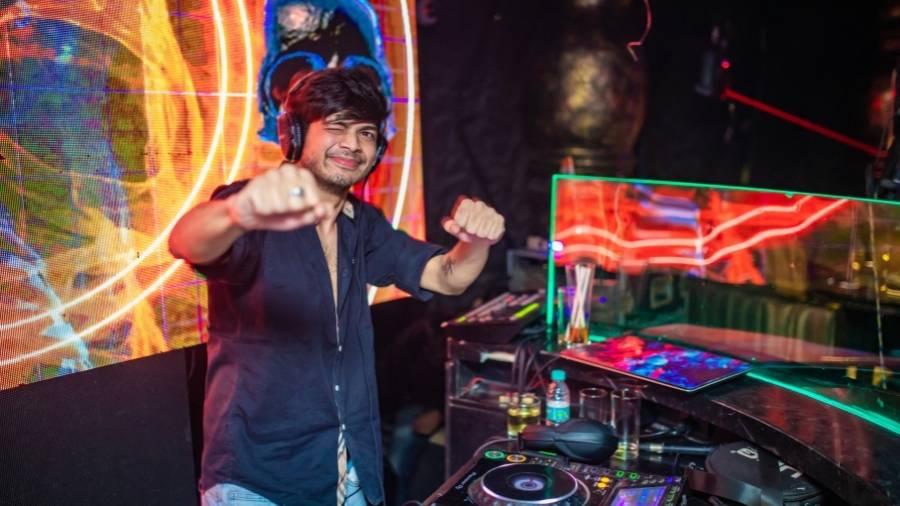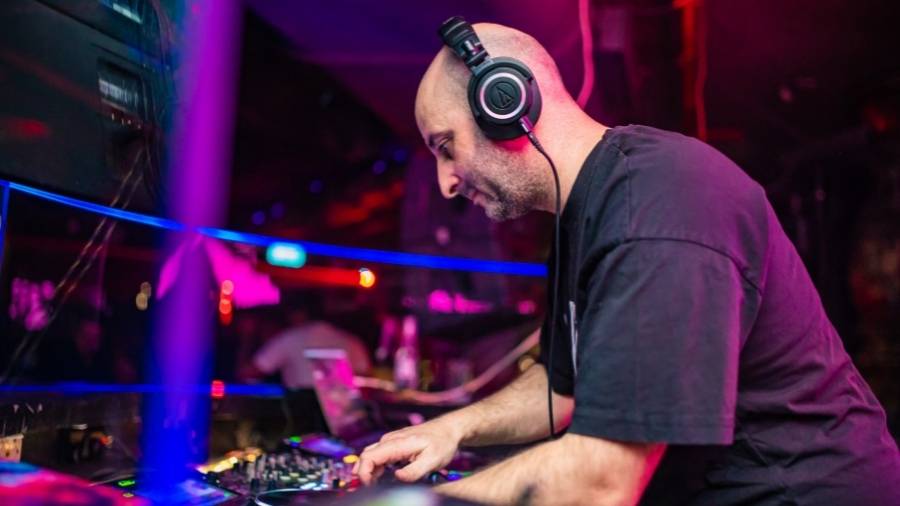It’s 2012. A 13-year old Arjun Chatterjee has just returned from a trip to the US with his first DJ console and decided to learn how to play music using it by reading the user manual.
Cut to 10 years later. Freakuency has just emerged from the gallery in Gold, JW Marriott Kolkata. He’s prepared to close down the night, following the headliner, international psy-trance DJ, Outsiders. There seems to be no pressure on him though, despite being one of the youngest psy-trance artistes to play all around the country. For him it’s just another Saturday night (or Sunday morning!).
My Kolkata caught up with the DJ-producer to talk about his journey, the perceptions of psy-trance and more before his gig.
My Kolkata: You actually work under two separate names. Tell us about that?
Arjun: So, under the name, Arjun, I release my own music. This is a more twilight style of psy-trance, where I play all my tracks in a live project format. Freakuency is my DJ project, where I play every genre of psy-trance depending on what's best for the night. It has a few of my tracks of course, but a lot of tracks by other producers too.
How did you develop an interest in music? Was DJing a part of the plan?
Being a Bengali born and bred in Kolkata, my family is quite musically inclined. My dad would always come back home from work and unwind over rock numbers. The general ambience at home was to chill with music, so I naturally developed an interest. My grandparents wanted me to learn how to sing and play the harmonium, so I started training in Indian classical music. I actually trained for four years — till I was in Class VIII.
In Class VIII, I went to the US with my family for a short vacation. There, I met my uncle’s friend, who was an orthopaedic doctor by day and DJ by night. I saw him playing music on his fancy controller, and it inspired me so much that I went and bought my first DJ console. It was a basic $200 controller, but I literally learnt DJing by reading the user manual for a year and fiddling around with everything.
Gradually, I got the hang of it, but that professional touch was still missing. To take my DJing to the next level, I enrolled at Scratch Lab DJing and Music Production Academy, which is run by Sudipto Ghosh aka DJ DiTs, a famous Bollywood DJ from the city. He taught me how it all works, and a couple of classes in, I was set to go.
How did you make the transition to performing?
In my school (The Heritage School), we had a fest called Youthopia. Since I was a junior in Class X, I was not eligible to participate in the competitions. But, my teachers knew that I could play well and gave me the guest performance slot after the War of DJs event. So, my first live performance was in front of a crowd of 4,500 people [chuckles]. In the next two years, I went to five school-level DJ competitions and won four. The good thing about musicians is that you get a lot of support from the scene when you're young. At these events, the judges were reputed DJs from Kolkata. A couple of them supported me by giving me gigs and getting the crowd to back me. I kept doing more gigs at clubs like Privy, Tantra and Palazzo.
By Class XII, people in Kolkata’s circles knew me as a professional DJ. My parents were also very supportive. Whenever I got gigs, they would make it a point to not only pick and drop me, but also stay for the entire evening. They’re the reason I am who I am today.
What drew you to create your own music?
I had been DJing for four years by the time school ended, and told myself that I should not leave this craft, or limit myself. No matter how great DJing is, it has its limits. I got into music production, because it gave me the chance to create my own music.
This brought me to Delhi, where I did a four-year Bachelors course in Music Production and Sound Engineering from Asian Academy of Film and Television (AAFT), Noida. In fact, I just graduated earlier this year. Parallel to my course, I played numerous gigs and slowly made my place in Delhi. I also set up an event management company in the city.
My gigs in Kolkata and Delhi caught the attention of bigger event organisers, and soon, I was booked for events in Goa too. Goa continues to be amazing, and one of my best gigs was at Cafe La Musica two months ago, where I played just before the headliner and had 500 people ready to pounce on my beats, with intense energy. My pivot to production also got me a contract with Goa-based Temple Twister Records, just after the 2020 COVID-19 lockdown.
Is that what sparked your interest in psy-trance music?
I was into commercial music in school, and mostly played English and Hindi hits besides hip-hop, rap and EDM. Delhi has a vibrant psychedelic music culture, with events every weekend, and the scene really gripped me in college. Psy-trance music particularly influenced me when I started organising parties, and moved into production two years ago.
The thing about psy-trance that got to me was how every track had a story. In most musical genres it is usually about the lyrics, and the melody/beats just play a supporting role. But what’s unique in psy-trance is that there are barely any lyrics, apart from the occasional mantra. The whole idea of listening to music that had an experimental feel was the driving force that got me interested.
Your debut single Martian Doobie has created quite a stir. Take us through its creation.
The idea was very simple — I wanted a track that was groovy and had driving baselines. A track with funky elements that would make people see my fun side. I wanted to create a number that people couldn’t stop moving on the dance floor. It took a year to create, and Macky MadHouse Records, a label from Italy, backed me for its release. Six months into its release, I have received a great response, selling close to 80 copies on Beatport and Bandcamp.
What are the driving factors behind your music?
I've always been into both rock and Indian classical, which my music mirrors. I really like natural instruments, be it African, European or Indian, and I look for interesting ways to use them in my creations. Classical music across cultures, especially Greek and African music, is a driving force. I consciously try to bring together a diverse range of sounds that have a contemporary tribal vibe to them, while also having a callback to more natural sounds. The objective is to take existing elements and make it my own, something that can be both contemporary and nostalgic.
What’s next for you?
I'm actually going to learn sound engineering, not only for music but also movies, particularly the Dolby 7.1 format. The objective is to integrate my sound engineering skills with my music, so I can mix recordings for studios. I’m going to Mumbai in January for a year to do a Masters course in sound engineering with The Audio Guys (TAG) Institute.
I will also be releasing an EP with three or four tracks, ideally with a Spanish record label. It will be based more on my Indian cultural roots, integrating a few mantras with Indian and African instruments. The vibe will have ritualistic and spiritual music elements.
I have two musical festivals in Goa coming up this December, apart from a tonne of events in both Kolkata and Goa. Beyond that, I have a gig every weekend. Since I am in event management, when I’m not making music, I host parties with the top international artists. It’s all about music for me.

